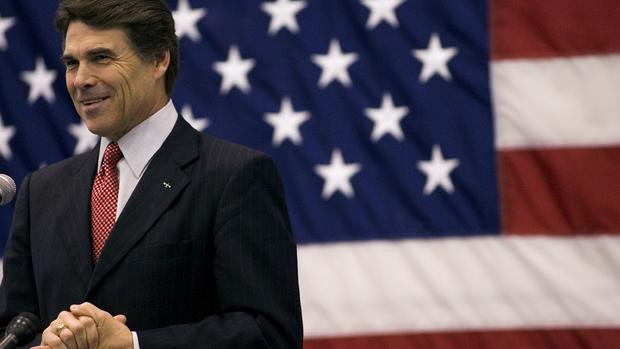The Rick Perry show comes to Iowa
This post originally appeared on Slate.
WATERLOO, Iowa--When Rick Perry arrived at the Electric Park Ballroom last night, he already looked like a veteran presidential candidate. His Texas security detail--focused men in dark suits--moved quietly around him. His aides spoke into microphones in their sleeves. Forty or so members of the press swarmed Perry at the door and then shuffled along together while he talked to voters.
Weeks ago, the organizers of the Black Hawk County Lincoln Day dinner thought that they would have to rely on an impersonator of the 16th president for entertainment. Instead, the circus came to town. For a night, the dimly lit ballroom was the center of GOP politics. Once Perry announced that he was coming, Rep. Michele Bachmann said she would attend. Sen. Rick Santorum also made a late entry, in order to be near the cameras that he complains don't follow him.
This is the new pace of the GOP presidential campaign. Within the last 48 hours, Michele Bachmann has become the front-runner in Iowa, Perry has started his campaign, and Tim Pawlenty has ended his. In the coming weeks, Perry will be in a hurry to make up for lost time. Bachmann will hustle to counter him in Iowa to keep from losing Tea Party support. Mitt Romney, who has been cautious and measured this summer, may feel the pressure to react to Perry if he starts gaining traction.
Mitt Romney, Rick Perry, Michele Bachmann and the new GOP presidential landscape
And Perry, the governor of Texas, looks like the kind of candidate who can get traction. He knows how to work a room. He moves his face close to voters, sometimes draping himself over them like a blanket. Though the press mob made it hard for him to move through the narrow spaces between the tables, his team knew how to keep him moving. Security gently cleared the way, guided by whatever incantations his political team whispered into their earpieces. They spotted Chuck Grassley, Iowa's senior senator, and the governor was piloted in that direction.
At another point, Perry, who had been diligently working each table, skipped a few to shake the hand of a young African-American man. They clutched while the cameras flashed and whirred. Maybe Perry was genuinely happy to greet this man, Michael Anthony. At the same time, like all good politicians, he knows a good photo op when he sees one. Afterward, I asked Anthony whether he'd ever met Perry. He hadn't. He assumed the affection was for the cameras: "Come on, I'm the only black man in the room."
Retail politics isn't everything, but in Iowa and New Hampshire, it's a big deal. Grassley said his main piece of advice when Perry called him to talk about running was that he needed to show up and meet voters. When the two met in the crowded ballroom, Perry was anxious to show he'd gotten the message. "Trust me, I'll be here often," he told Grassley.
Perry's speech was energetic and well-received. He roamed the stage and punctuated his points with a variety of the gestures in his considerable arsenal. "Sometimes it takes me a while to get into something," he said, after describing the 16 years he'd known his wife before marrying her. "But let me tell ya: When I'm in, I'm in all the way." As he worked his way to the punch line he sat as if appearing to go into chair pose.
Perry's started with protein-rich Powerbar of biography--growing up in Paint Creek, Texas, a town without a ZIP code, farming cotton with little rain, his achievements in 4-H and the Boy Scouts, flying jets in the Air Force.
He didn't take on any of his opponents. It's way too early for that. The lines of distinction were obvious, though. He stressed his record of creating jobs--the central question in the campaign. He promised to cut government spending, and if Congress didn't go along, he would use his veto pen "until the ink went dry."
Perry's threat to Romney is that he has more relevant executive experience: He has used government to help create jobs. His threat to Bachmann is that he is a better voice for the Tea Party. That's her signature claim, and Perry tried his hand at it. Identifying himself with the movement, he addressed accusations that "Tea Party types" are angry. "We're not angry, we're indignant," he said. "We're indignant at the arrogance and the audacity that this administration is showing about the values that are important to the good people of America."
The speech was bumpy at times. He pledged that when he became president members of the military would once again have someone they respected in the Oval Office. That's a pretty serious charge to make both about the commander in chief and the military, which drills its members to respect the president no matter what. Also, he may want to lose that line about how the wrinkles in his shirt were not his wife's fault--at least by the time he gets to the general election and starts going after those suburban swing-voting women.
Bachmann spent less than one-quarter of the time that Perry did with voters, though of course she had just spent weeks campaigning with a personal touch in the runup to the straw poll. She stressed her local roots, having been born in Waterloo: "I'm not a politician, I'm a real person ... raised by real people." It was a glancing shot at both Perry and Romney, whose looks and manners appear to come from central casting. It will be a neat piece of jujitsu if a member of Congress can play the outsider against a governor and former governor. Usually, it's the other way around.
More from Slate:
The GOP presidential campaign kicks into a new phase
Republicans swoon for Sarah Palin at the Iowa State Fair
Copycat: Where does the term come from?


